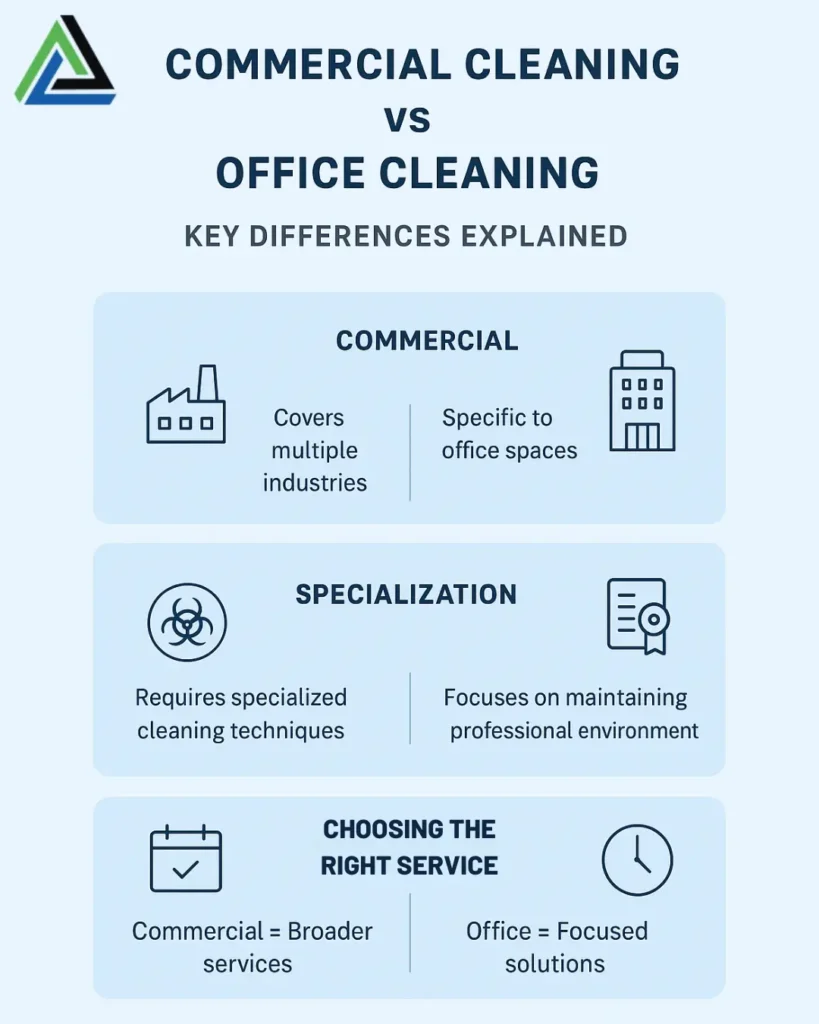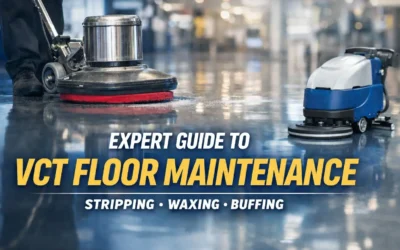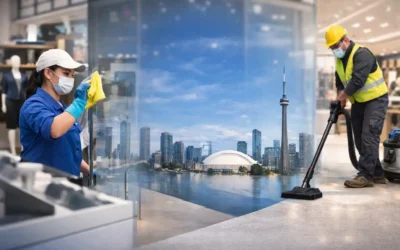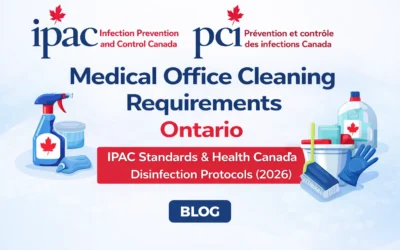When it comes to professional cleaning services, many people use the terms commercial and office cleaning interchangeably. However, these two services, while related, have distinct differences that are important to understand whether you’re a business owner, facility manager, or someone entering the cleaning industry. Let’s dive deep into what sets these cleaning services apart and why choosing the right one matters for your specific needs.
Understanding Commercial Cleaning: The Big Picture
Commercial cleaning is the umbrella term that encompasses all professional cleaning services provided to businesses, organizations, and commercial properties. Think of it as the entire forest, while office cleaning is just one type of tree within that forest. Commercial cleaning covers an incredibly diverse range of facilities and environments, each with its own unique requirements and challenges.
When we talk about commercial cleaning, we’re referring to professional cleaning services for retail stores, shopping malls, warehouses, manufacturing facilities, medical centers, schools, restaurants, gyms, movie theaters, and yes, offices too. Each of these environments demands specialized knowledge, equipment, and cleaning protocols. For instance, a medical facility requires strict sanitization procedures and knowledge of biohazard handling, while a restaurant needs deep kitchen cleaning and grease management expertise.
The scope of commercial cleaning often extends beyond what most people imagine. It includes specialized services like post-construction cleanup, where teams remove construction debris and fine dust that settles everywhere after renovation work. It encompasses industrial cleaning with heavy-duty equipment for factories and warehouses. It covers high-rise window cleaning requiring specialized safety equipment and training. Commercial cleaners might find themselves sanitizing a daycare in the morning, deep cleaning a restaurant kitchen in the afternoon, and preparing a retail space for a grand opening in the evening.
Office Cleaning: A Specialized Focus
Office cleaning, on the other hand, is a specific subset of commercial cleaning that focuses exclusively on corporate workspaces, administrative buildings, and professional environments where desk-based work primarily occurs. This specialization allows cleaning professionals to develop expertise in the unique challenges and requirements of maintaining office environments.
Office cleaning typically revolves around maintaining spaces where professional activities take place – think cubicles, conference rooms, executive suites, reception areas, and corporate break rooms. The primary goal is creating and maintaining a clean, organized, and professional atmosphere that promotes productivity and makes a positive impression on both employees and visitors.
The tasks involved in office cleaning are tailored to the office environment’s specific needs. This includes dusting computer equipment and keyboards (which require special care to avoid damage), sanitizing shared phones and conference room equipment, maintaining professional carpeting that sees heavy foot traffic in certain patterns, and ensuring break rooms and kitchenettes meet hygiene standards without the intensive requirements of commercial kitchen cleaning.
Office cleaners become experts at working around business operations. They understand how to clean efficiently without disrupting important documents, how to maintain confidentiality when working around sensitive information, and how to schedule services to minimize interference with business activities. Many office cleaning services operate during off-hours, requiring trustworthy staff who can work independently in empty buildings.
Key Differences in Scope and Specialization

The fundamental difference between commercial and office cleaning lies in their scope and specialization requirements. Commercial cleaning requires versatility and broad knowledge across various industries and facility types. A commercial cleaning company might need expertise in everything from healthcare regulations to food safety standards, from industrial cleaning chemicals to eco-friendly green cleaning methods for educational facilities.
Office cleaning, while narrower in scope, demands deep expertise in creating and maintaining professional business environments. Office cleaners become specialists in their field, understanding the subtle differences between cleaning requirements for law firms versus tech startups, or financial institutions versus creative agencies. They know that a law firm might prioritize immaculate conference rooms and leather furniture care, while a tech company might focus more on maintaining collaborative spaces and dealing with the unique challenges of 24/7 operations.
Equipment and Training Variations
The equipment and training requirements also differ significantly between these two cleaning types. Commercial cleaning often requires a vast array of specialized equipment – from industrial floor scrubbers and high-pressure washing systems to specialized safety gear for hazardous environments. Commercial cleaners might need certifications in handling biological hazards, working at heights, or operating heavy machinery.
Office cleaning equipment tends to be more standardized but requires finesse in its application. High-quality vacuum cleaners with HEPA filtration for improved air quality, microfiber cleaning systems for streak-free surfaces, and ergonomic tools for efficient cleaning of desk spaces are standard. Training focuses more on efficiency, attention to detail, and professional conduct in corporate environments rather than on operating complex machinery or handling dangerous materials.
Service Frequency and Scheduling Considerations
Another crucial difference lies in service scheduling and frequency. Commercial cleaning schedules vary dramatically based on the facility type. A hospital requires round-the-clock cleaning services, a restaurant needs daily deep cleaning after closing hours, while a warehouse might only need weekly or monthly service for common areas.
Office cleaning typically follows more predictable patterns aligned with business hours. Most offices require daily or several-times-weekly cleaning of high-traffic areas and workspaces, with periodic deep cleaning scheduled quarterly or annually. The predictability of office cleaning schedules allows for better resource planning and consistent service delivery, making it easier to maintain long-term client relationships and stable workforce scheduling.
Making the Right Choice for Your Business
Understanding these differences is crucial when selecting cleaning services for your facility. If you manage a traditional corporate office, seeking a company that specializes in office cleaning ensures you’re working with professionals who understand your specific needs and challenges. They’ll know how to maintain your space efficiently while respecting the professional environment and your employees’ workspace.
However, if you operate a mixed-use facility or have diverse cleaning needs – perhaps an office building with a ground-floor retail space, an attached warehouse, or an on-site cafeteria – you’ll want a full-service commercial cleaning company capable of handling all these different environments effectively.
Conclusion
While office cleaning is indeed a part of commercial cleaning, understanding their differences helps businesses make informed decisions about their cleaning needs. Commercial cleaning offers broad, versatile services across various industries and facility types, bringing diverse expertise and equipment to handle any cleaning challenge. Office cleaning provides specialized, focused services tailored to maintaining professional workspaces with the expertise and discretion that corporate environments demand.
Whether you need the comprehensive capabilities of commercial cleaning or the specialized expertise of office cleaning, choosing the right service ensures your facility maintains the cleanliness standards necessary for success. The key is understanding your specific needs and partnering with cleaning professionals like MCA Group, who have the right expertise, equipment, and experience to meet them effectively.





